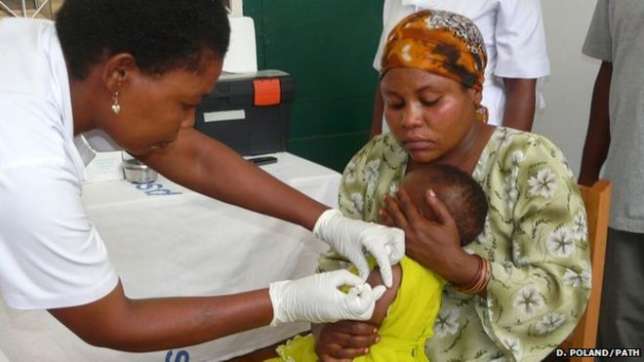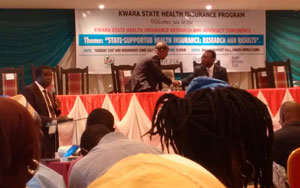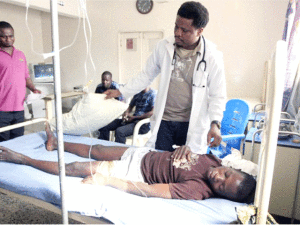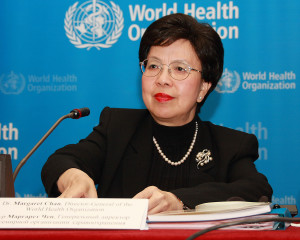World's first malaria vaccine approved
 The vaccine, Mosquirix, otherwise known as the RTS,S vaccine, is the first against a parasitic infection in humans, and it was developed by GlaxoSmithKline. The world has come a step closer to fighting malaria as the first ever malaria vaccine has cleared one of the final hurdles prior to being approved for use in Africa. The European Medicines Agency gave a positive scientific opinion after assessing its safety and effectiveness. The vaccine, Mosquirix, otherwise known as the RTSS vaccine, is the first against a parasitic infection in humans, and it was developed by GlaxoSmithKline.
The vaccine, Mosquirix, otherwise known as the RTS,S vaccine, is the first against a parasitic infection in humans, and it was developed by GlaxoSmithKline. The world has come a step closer to fighting malaria as the first ever malaria vaccine has cleared one of the final hurdles prior to being approved for use in Africa. The European Medicines Agency gave a positive scientific opinion after assessing its safety and effectiveness. The vaccine, Mosquirix, otherwise known as the RTSS vaccine, is the first against a parasitic infection in humans, and it was developed by GlaxoSmithKline.
According to BBC, the World Health Organization will consider later this year whether to recommend it for children, among whom trials have yielded mixed results. GSK has not revealed the price of the vaccine, but has pledged not to make a profit from it. It has been designed specifically to combat malaria infection in children in Africa and will not be licensed for travellers. The vaccine works by triggering the immune system to defend against the first stages of infection by the Plasmodium falciparum parasite after it enters the bloodstream following a mosquito bite.
The Avoidable Crisis in the Health Sector BY Abdullahi Sadiq

The Nigerian health sector also suffered enough trauma from strike actions from other non- doctors staff under joint health union. These and many other reasons make Nigeria one of the worst countries for women and children to live with maternal death due to pregnancy and childbirth put at 1 in every 29 Nigerian women. This seriously threatens Nigerian ability to achieve Millennium Development Goals (4 and 5) of reducing infant mortality and improving maternal health.
HFN PARTICIPATES IN KWARA STATE HEALTH INSURANCE RESEARCH AND ADVOCACY DAY
 The HFN, in line with its cardinal goals of a better private healthcare sector, currently participated in the Kwara State Health Insurance Research and Advocacy Day in the ancient capital, Ilorin. The objective is to gather experts from the private sector, academia, government, non-government organizations and donors as well as local communities to discuss and research the lessons learned from the Kwara State Health Insurance Program and the implications for delivery of quality healthcare in Nigeria.
The HFN, in line with its cardinal goals of a better private healthcare sector, currently participated in the Kwara State Health Insurance Research and Advocacy Day in the ancient capital, Ilorin. The objective is to gather experts from the private sector, academia, government, non-government organizations and donors as well as local communities to discuss and research the lessons learned from the Kwara State Health Insurance Program and the implications for delivery of quality healthcare in Nigeria.
The Kwara State Health Insurance is a public-private partnership between the Government of Kwara State, Hygeia HMO, Health Insurance Fund, and the PharmAccess. As a result, the UN Secretary-General Mr Ban Ki-Moon has described it as groundbreaking and innovative. In 2014, the initiative was recognized by the OECD Development Assistance Committee for Taking Development Innovation to Scale. One unique feature of the Program is its research component to continuously measure its impact, the cost-effectiveness of maternal health care and other important attributes of the program. This has resulted in more than 50 peer-reviewed publications.
CAMA ANNUAL TECHNICAL FORUM 2015
 Malaria is a topical concern in Nigeria. It is one of the two countries that together account for nearly half of the global malaria burden. Vulnerable groups such as under-5 – 300,000 die annually according to the Malaria Programme for States - and pregnant women are usually its victims with costs to the economy amounting to N480 billion in losses annually.
Malaria is a topical concern in Nigeria. It is one of the two countries that together account for nearly half of the global malaria burden. Vulnerable groups such as under-5 – 300,000 die annually according to the Malaria Programme for States - and pregnant women are usually its victims with costs to the economy amounting to N480 billion in losses annually.
As a result, on the 23rd and 24th July, the Grand Ball Room of the Intercontinental Hotel paid host to healthcare professionals, development experts, health economists, social sector workers and many other health-related people to the Annual Technical Forum of the Corporate Alliance on Malaria in Africa (CAMA) 2015. This was tagged “Mobilizing the Private Sector in the Fight against Malaria”, a reflection of the current line of thought in health discourse in the nation.
Uniiorin Working To Develop Ebola Vaccine, Says VC
 Prof. Abdulganiyu Ambali, the Vice-Chancellor of University of Ilorin (Unilorin), says the institution’s Ebola Research Committee is working toward developing a vaccine for the Ebola virus. Ambali, who disclosed this in an interview with the News Agency of Nigeria (NAN) on Sunday in Abuja, said that the process of developing a vaccine was a long one. “What is happening is that the committee is just monitoring events; in terms of the vaccine, it will take a while because there are processes that you have to follow before you develop a vaccine.
Prof. Abdulganiyu Ambali, the Vice-Chancellor of University of Ilorin (Unilorin), says the institution’s Ebola Research Committee is working toward developing a vaccine for the Ebola virus. Ambali, who disclosed this in an interview with the News Agency of Nigeria (NAN) on Sunday in Abuja, said that the process of developing a vaccine was a long one. “What is happening is that the committee is just monitoring events; in terms of the vaccine, it will take a while because there are processes that you have to follow before you develop a vaccine.
“For example, you have to isolate the virus; grow the virus; attenuate the virus; bring it out for testing; and then before the final usage. “So those are the processes that any vaccine candidate will have to pass through before you can now use on victim. “But right now what they are doing is monitoring events across the borders; and then we have put in place the facilities to be able to advise our staff as well as students that want to visit those places (High risk Ebola countries).
LG Spends N100 M On 10 Rural PHCS
 Binji Local Government in Sokoto State has spent N100 million into the construction of 10 Primary Healthcare Centres (PHCs), its Chairman, Alhaji Umaru Danhabe, said in Sokoto, Sokoto State, on Sunday.Danhabe told the News Agency of Nigeria (NAN) that the council spent N10 million in constructing each of the facilities.
Binji Local Government in Sokoto State has spent N100 million into the construction of 10 Primary Healthcare Centres (PHCs), its Chairman, Alhaji Umaru Danhabe, said in Sokoto, Sokoto State, on Sunday.Danhabe told the News Agency of Nigeria (NAN) that the council spent N10 million in constructing each of the facilities.
According to him, each of the PHCs had 10 wards with beds for 20 patients. He said that one ambulance had also been provided to each of the centres to cater for emergency situations. The chairman advised the people to promptly report any outbreak of epidemic to the nearest health centres, and assured them of government’s readiness to cater for their health needs.
Source:Leadership Online
Unsafe Injections Cause 2m Hepatitis Cases Annually – WHO
 The World Health Organisation (WHO) has said that about two million people a year contract hepatitis from unsafe injections. It added that there is an urgent need for countries to enhance action to prevent viral hepatitis infection and to ensure that people who have been infected are diagnosed and offered treatment. The WHO director general, Dr Margaret Chan, disclosed this yesterday in a statement to mark World Hepatitis Day 2015 with the theme “Prevent Hepatitis. Act Now”.She said, “These infections can be averted through the use of sterile syringes that are specifically designed to prevent reuse.”
The World Health Organisation (WHO) has said that about two million people a year contract hepatitis from unsafe injections. It added that there is an urgent need for countries to enhance action to prevent viral hepatitis infection and to ensure that people who have been infected are diagnosed and offered treatment. The WHO director general, Dr Margaret Chan, disclosed this yesterday in a statement to mark World Hepatitis Day 2015 with the theme “Prevent Hepatitis. Act Now”.She said, “These infections can be averted through the use of sterile syringes that are specifically designed to prevent reuse.”
She noted that eliminating unnecessary injections is also an effective strategy to protect against hepatitis transmission. “There are 16 billion injections administered every year. Around 5 per cent of these injections are for immunisation, a further 5 per cent for procedures like blood transfusions and injectable contraceptives, and the remaining 90 per cent to administer medicines. For many diseases, injections are not the first recommended course of treatment and oral medications could be used,” she said.
Health sector needs political will to thrive —Jaiyesimi
 The Associate Medical Director for Patient Safety at the Basildon and Thurrock University Hospitals NHS Foundation, United Kingdom, Prof. Rotimi Jaiyesimi, has said that lack of political will to invest in infrastructure is one of the reasons the health sector has been performing below the optimum. Jaiyesimi, a consultant gynaecologist/obstetrician, emphasised the need for the governments at all levels to deliver accessible and affordable care, starting from the rural areas where well-established primary health care centres are few and far between. He said, “The primary care has to be looked at, because the rural areas and the smaller cities are where most Nigerians live and, sorry to say, die also. We need a well-equipped primary health care system, while we do not neglect the secondary and tertiary centres either.
The Associate Medical Director for Patient Safety at the Basildon and Thurrock University Hospitals NHS Foundation, United Kingdom, Prof. Rotimi Jaiyesimi, has said that lack of political will to invest in infrastructure is one of the reasons the health sector has been performing below the optimum. Jaiyesimi, a consultant gynaecologist/obstetrician, emphasised the need for the governments at all levels to deliver accessible and affordable care, starting from the rural areas where well-established primary health care centres are few and far between. He said, “The primary care has to be looked at, because the rural areas and the smaller cities are where most Nigerians live and, sorry to say, die also. We need a well-equipped primary health care system, while we do not neglect the secondary and tertiary centres either.
“Though our governments create policies, the problem is in the delivery. The current three per cent of the GDP being allocated to health is grossly inadequate. I would recommend anything between six and 10 per cent if we are serious about revamping the health sector.” Jaiyesimi, who had served as a member of Faculty, First Emergency Care Conference Training in Abuja, emphasised the need for research, saying it would lead to manufacturing of drugs locally, effectively addressing Nigeria’s drug need.
NAIP says unguarded drug importation aids counterfeiting
 Members of the National Association of Industrial Pharmacists have condemned unbridled drug importation, saying it contributes to the burden of counterfeiting in the country. Speaking at the third bi-monthly meeting of the association in Lagos on Thursday, a pharmacist and retired Assistant Inspector General of Police, Alex Okeke, said most of the counterfeit medicines in Nigeria are imported.He said that one of the major challenges being faced by the regulatory agencies globally is the counterfeiting of pharmaceutical products.
Members of the National Association of Industrial Pharmacists have condemned unbridled drug importation, saying it contributes to the burden of counterfeiting in the country. Speaking at the third bi-monthly meeting of the association in Lagos on Thursday, a pharmacist and retired Assistant Inspector General of Police, Alex Okeke, said most of the counterfeit medicines in Nigeria are imported.He said that one of the major challenges being faced by the regulatory agencies globally is the counterfeiting of pharmaceutical products.
Okeke said there is incontrovertible proof that most of the counterfeit drugs in circulation are imported to Nigeria. He said, “Any drug that goes via land into the country is illegal; because the government has ordered drug importation to be done through the sea and airports only.” He added that a major reason for the circulation of such drugs was the poor funding of the nation’s health sector. “A massive campaign should be embarked upon to enable the government see the need to support the local pharmaceutical industry to build capacity and produce drugs locally to meet the international standards, at cheap and affordable rate, thereby reducing dependence on imported drugs,” Okeke said.
Pharmacists’ Council Seals off 236 Medicine Shops in Ekiti
 Disturbed by the increasing number of illegal drug outlets in Ekiti State, the Pharmacists Council of Nigeria (PSN) said it has sealed off 236 shops in the state. The council said, the raid conducted by the officers of the drug regulatory body was not meant to send people out of job or create unnecessary panic in the system, but to ensure compliance to rules, particularly on proper registration, to safeguard the health of the Nigerian citizens. Speaking with journalists in Ado Ekiti weekend, the PCN Deputy Director and Head of Enforcement, Pharmacist Stephen Esumobi, said out of 240 premises visited, only four were given a clean bill, describing the development as dangerous and inimical to the people’s wellbeing.
Disturbed by the increasing number of illegal drug outlets in Ekiti State, the Pharmacists Council of Nigeria (PSN) said it has sealed off 236 shops in the state. The council said, the raid conducted by the officers of the drug regulatory body was not meant to send people out of job or create unnecessary panic in the system, but to ensure compliance to rules, particularly on proper registration, to safeguard the health of the Nigerian citizens. Speaking with journalists in Ado Ekiti weekend, the PCN Deputy Director and Head of Enforcement, Pharmacist Stephen Esumobi, said out of 240 premises visited, only four were given a clean bill, describing the development as dangerous and inimical to the people’s wellbeing.
Esumobi revealed that they committed offences ranging from unauthorized sale of medicines, operating without the supervision of a pharmacist and poor storage and documentation facilities. He said the clarification over the allegation that the body was becoming too coercive became imperative in view of the protest staged against the closure of some medicine shops by Association of Drug dealers in Ado Ekiti last Thursday. “It surprised me that people had to protest in that manners and numbers. It shows that it was a premeditated action. We are not out to make life difficult for them, but to ensure compliance to simple rules. As a regulatory body, we cannot allow the sale of drugs that can kill innocent people.






